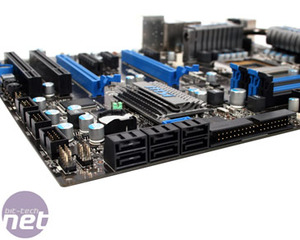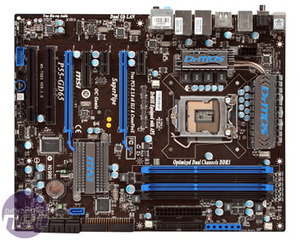
The OC Genie is a one button auto-overclock for your CPU: it'll spend a few seconds checking the hardware and seeing how much extra base clock and memory performance can be added within a known, elevated voltage range, while simultaneously disabling the Intel TurboBoost function to offer more stability.
MSI wholly admits overclocking yourself will generate a better top speed, and the one button approach is simply for those who are unfamiliar with the overclocking process - the bottom line of the OC Genie is free performance for a few seconds of work. If you don't like the settings, simply unpress the button, reset the BIOS defaults, turn off the PC and try again.
In addition to this, there are two buttons on the motherboard to increase/decrease the base clock without the need of software. This can be done at any time with the OC Genie enabled. We won't claim that this is particularly novel - it's something Asus included on its (most expensive) RoG boards a year ago, and continues to include it thanks to the little known TweakIT function. However, the difference is MSI has now brought this feature to a more affordable price point.
Near the top of the GD65 by the memory slots is the V-Check point. In the blue plastic holes are metal prongs that can be used to check the realtime voltage points with a multimeter. This takes out the uncertainty of BIOS readings and can more accurately measure phenomena like vDrop compared to what the BIOS voltages are set to, and vDroop when the CPU and memory are fully loaded. Previously these features have been resigned to very high end boards under the overclocking brands from Asus, Foxconn and EVGA - it's great to see such a simple and useful feature drop onto MSI's board here.
Finally, there's still the usual GreenPower and DrMOS hardware power saving, and further MSI BIOS features we'll dive into in the actual review.
Overall we're impressed by the board at this stage, but given the features we're unsure how cheap it will actually be. Seeing as MSI had to go for a pooh coloured PCB and strip virtually everything from its X58 boards to get them below £160, how cheap can the GD65 actually go with the complete opposite approach? We'll have to wait to find that out.
MSI wholly admits overclocking yourself will generate a better top speed, and the one button approach is simply for those who are unfamiliar with the overclocking process - the bottom line of the OC Genie is free performance for a few seconds of work. If you don't like the settings, simply unpress the button, reset the BIOS defaults, turn off the PC and try again.
In addition to this, there are two buttons on the motherboard to increase/decrease the base clock without the need of software. This can be done at any time with the OC Genie enabled. We won't claim that this is particularly novel - it's something Asus included on its (most expensive) RoG boards a year ago, and continues to include it thanks to the little known TweakIT function. However, the difference is MSI has now brought this feature to a more affordable price point.
Near the top of the GD65 by the memory slots is the V-Check point. In the blue plastic holes are metal prongs that can be used to check the realtime voltage points with a multimeter. This takes out the uncertainty of BIOS readings and can more accurately measure phenomena like vDrop compared to what the BIOS voltages are set to, and vDroop when the CPU and memory are fully loaded. Previously these features have been resigned to very high end boards under the overclocking brands from Asus, Foxconn and EVGA - it's great to see such a simple and useful feature drop onto MSI's board here.
Finally, there's still the usual GreenPower and DrMOS hardware power saving, and further MSI BIOS features we'll dive into in the actual review.
Overall we're impressed by the board at this stage, but given the features we're unsure how cheap it will actually be. Seeing as MSI had to go for a pooh coloured PCB and strip virtually everything from its X58 boards to get them below £160, how cheap can the GD65 actually go with the complete opposite approach? We'll have to wait to find that out.

MSI MPG Velox 100R Chassis Review
October 14 2021 | 15:04












Want to comment? Please log in.